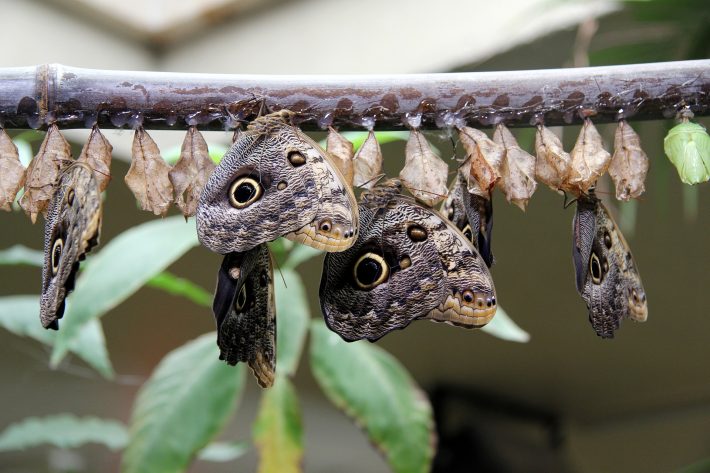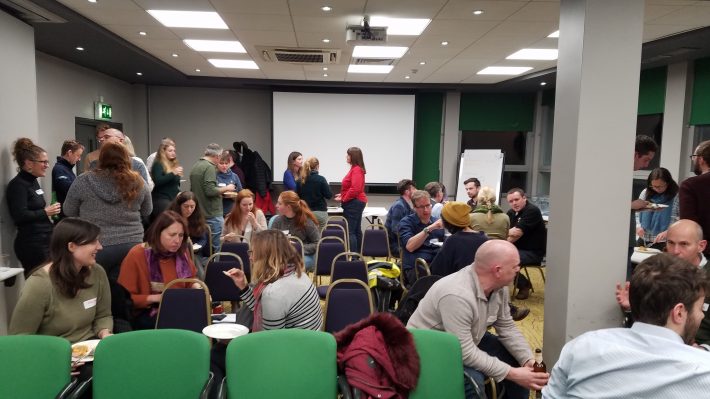Transformative change: an idiot’s guide
Fresh from the BES’s ‘Pie And A Pint’ event on achieving transformative change, Andy Suggitt reflects on what the role of ecologists in this might be…

“A little learning is a dang’rous thing; Drink deep, or taste not the Pierian spring; There shallow draughts intoxicate the brain, And drinking largely sobers us again.” (Pope 1711, An Essay on Criticism).
‘Transformative change’. It’s pretty straightforward right? It’s just a really big change. And yet there’s something about the phrase that is inherently difficult to grasp. It’s something of a tautology- surely a ‘change’ implies a transformation of sorts? But it’s also an enigma- it somehow encompasses everything and nothing in particular at the same time.
Struggling a bit, I turn to the font of all (modern-day) knowledge and do some searching. Complicated diagrams with sinuous peaks and troughs appear. Arrows point one way, then the other. Some arrows point both ways. In one particular example, a never-ending loop sees unfortunate participants going round and round the same figure-of-eight course, presumably in some happy state of perpetuity.
Luckily for idiots like me, figuring out exactly what transformative change is and what makes it work has been the subject of whole lines of research, and even entire careers. The speed at which this research is gaining traction amongst the policy community is quite remarkable. Commenting on the latest IPBES Global Assessment Report on Biodiversity and Ecosystem Services earlier this year, Bob Watson called for a “transformative change” to fix the crisis in the natural world, specifying that we need a: “fundamental, system-wide reorganization across technological, economic and social factors, including paradigms, goals and values”.
It is quite clear that such a reorganization would require serious levels of commitment from all sectors of society, and this will be quite a challenge. But anyone looking to fix environmental issues with transformative change must clear a further hurdle beforehand, in that most scientists who work in this field legitimately perceive themselves to be fighting a rear-guard action against the downsides of modern progress. I include myself in that, of course. Change? No, we conserve, thank you very much. We aim to keep things the way they were.
So a focussed event to discuss transformative change in ecology was certainly in order, and in fact was probably overdue. But something that the BES policy team and I didn’t quite expect when we set about organising this event was quite how popular it would turn out to be- the tickets were snapped up almost as soon as they were released.
Perhaps it was the ‘Pie and a pint’ format that was attractive, and people were just happy to be getting fed and watered. Or perhaps interest in the topic had grown far more than we had estimated.
I’ve never been the biggest fan of lectures or talks delivered in ‘church’ format, where one authority figure talks and everyone else listens. And for this topic in particular, forcing so-called participants to sit passively for long periods doesn’t really align itself with understanding or even encouraging the sort of active change in people’s attitudes or beliefs that any transformative change will need. So we instead kicked off the session with a small number of lightning talks, almost elevator pitches, to give people a flavour for what to expect in discussions later on. Without us really planning it- I’d love to say we did- these talks became something of a how-to guide on transformative change (see our ten top tips below).
The first key message for me was this:
getting transformative change, and becoming an advocate for it, is largely about the journey that we all must go through in our own heads.
Yet despite the fact that this theme kept cropping up throughout the evening, it was still a surprise to see just how many of these journeys were taking place on the night of the event itself.
Although many initially struggled to find common ground in the group discussions, it wasn’t too long before the room was alive with people from all backgrounds swapping stories and building on each other’s ideas. It was a powerful reminder of how much more effective it is to bring people together under one roof, rather than to rely on us all just talking at each other over the internet.

Another important realisation for me was that many of the more fundamental observations on the direction of ecology and policy were made by those without a background in the subject. As Pope hints at in the quote above, a deeper, broader understanding is far more likely to result in safer inferences than a narrow, singular one. We need to move to a situation where working across disciplines is the norm, not just an aspiration. This will require a re-orientation of all the incentives that ecologists respond to. And to truly be transformative, it probably necessitates the creation of some new ones. Are we ready for this? Because surely if we are to convince others to make these changes, the first job is to convince ourselves.
As we were close to wrapping up the event, one of the expert speakers said to me, somewhat wryly: “No-one was talking about this five years ago. It’s nice to be popular…”.
For me, we will only know if we have truly transformed ourselves if we are still talking about this in five, ten or even fifty years from now. We’d better get started, then.
Pathways to transformative change- in no particular order, here are ten top tips from our speakers:
- Foster collective ownership of the idea widely, and particularly amongst non-experts.
- Go beyond just structures and systems- target core values and beliefs.
- Maintain a global context, so that positive changes you make locally don’t have negative implications elsewhere.
- Tread the fine line between maintaining your authenticity and being truly novel.
- Recognise the aspects of nature that cannot be quantified- majesty, wonder, and its relationship with wellbeing.
- Renew and strengthen the positive relationships between People and Nature.
- Use language to set the direction- restoration, regeneration vs. conservation, sustainability.
- Beware inciting ecological grief, which is unlikely to motivate people to change.
- Tackle shifting baseline syndrome.
- Let nature dictate the outcome, and work with it, not against it.
With thanks to speakers Rachel Bice, Ioan Fazey, Hannah Grist, Callum Roberts, David Rooke & Chris Thomas, and to the British Ecological Society for funding the event.
Like what we stand for?
Support our mission and help develop the next generation of ecologists by donating to the British Ecological Society.